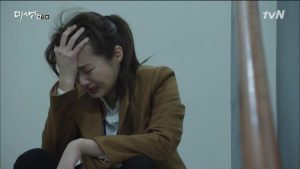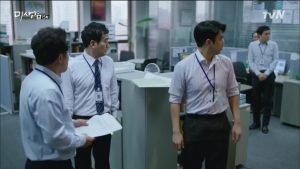Symnopsis: Episode 14: Geu-rae once again remembers that he is the only intern among his peers. He asks Oh if he can become a permanent employee. Episode 15: Geu-rae continues to work diligently despite learning he can’t become a permanent employee. He goes to town with Baek-gi on an assignment from Oh.
In the workplace, it seems very important to remain calm, and focused on tasks at hand to be professional, but that can be difficult when you have circumstances that affect your personal life. In South Korea, unless you experience tragedy such as a death in the family, it is believed that you should not let your personal life affect your performance in the workplace. When you show weakness by letting your work slack, it can be seen as affecting the efficiency of work and affect your coworker’s performance as well.
In the drama, Misaeng, we can see the character Young-yi is working diligently, to overcome the discrimination she receives from her superiors in the workplace. She seems to be managing, until we see her struggle with the responsibility of filial piety. Her mother and father calls her, begging her for money lost due to gambling, and expect her to bail them out of their debt. Young-yi is a strong and self-made woman, but we can see her visibly shaken when angrily telling off her parents, refusing to allow them to keep using her when she thought she had finally recovered after suffering in the past, paying off her father’s pervious debts. We can see that when she thought she could live her life freely, that she is tied down and held back by her parents being a burden.

The responsibility of honouring one’s parents weighs heavy on many Korean’s hearts and minds. Filial Piety is a deep-rooted Confucian tradition that carries on in Korea that three quarters of Koreans still agree with and follow. All grown children in Korea are expected to have the responsibility and obligation for their aged parents’ well-being because of the reciprocal dependence of successive generations (Lee 2015). This is changing slowly as the traditional family structure is changing into nuclear households and the rising costs of housing and education, and less elderly are relying on their children to care for them long term.
Young-yi may think she can ignore her parents’ pleas of help for financial assistance, and attempts to keep working on her project and tasks assigned to her by her resource team, butgambling can affect entire families. We can see Young-yi have substantial stress and unable to focus on her professional life as this pressure of bailing out her parents from being kicked out of their home weighs heavily on her shoulders. Her sense of filial piety is so strong she struggles to do basic tasks in the office which gets her in trouble with Manager Ma and her coworkers.


Questions:
- What do you think Ahn Young-yi should do with her parent’s pleas for another bail out? What would you do in her situation?
- Do you think Filial Piety should continue in Korea? To what extent should Filial Piety apply to situations?
Photos are screenshots from the drama, no copyright infringement is intended.
Works Cited:
Lee, Da-Young. “77% of South Koreans See Need for ‘Filial Duty Contracts’.” Korean Herald, 2015. http://www.koreaherald.com/view.php?ud=20151230001116
Kim, Won-seok, dir. Misaeng. Number 3 Pictures, 2014. https://www.netflix.com/watch/80165296?tctx=0%2C0%2C2ccd12e1-70d7-46d9-8aae-7ac139b241fa-124328052%2C%2C.
Hi Helen,
Watching Young-yi in that situation was really hard to watch because of the emotional scars she’s been through in that family. I like how you brought up how her personal issues reflected her work performance. It is something that we should take into serious consideration when thinking about how gender imbalance can impact one’s life. Young-yi’s dad who only uses her as a means of getting money, and doing so by making her feel guilty for not being born a boy is unsound. In Young-yi’s situation, I believe that she should neglect her parents, at least until her parents treat her like an adult and not someone to take advantage of. I definitely feel that Filial Piety should still stay in Korea to an extent where there is a strong relationship between the parents and their kids. If one was brought up in an environment of unfulfilling love and care, the kids do not have to fully respect their parents. At the end, we cannot force children to pay back their parents for everything they’ve done, that would be an unsettled way of living. Filial Piety should come from the heart, yet it should still be an idea aware by all children so that they know how hard their parents work.
Good essay Helen! I liked your comments on how Koreans clearly divide work life from personal life. I have always respected this attitude but find that I couldn’t possibly copy this way of living. I feel it really isn’t healthy to bottle up emotions cause it will explode and you might not like the results.
#1
I am unsure of what Ahn Youn-yi should do, as it is never stated the exact amount her parents owe or how much she makes at One International. Cause if she can’t help them financially she shouldn’t. She did go to a bank to take out a loan however how long it will take her to pay back could affect my answer.
For instance, if this will financially affect her for less than 2 years I would say she should do it. However, more than 2 years I would say let her parents reap the consequences of their actions. Also I would have my parents make some sort of agreement with me that they would hand over all their money and I would give them small allowances to pay for things. Cause even though I am crap with money, I am probably better than Young-Yi’s parents. If my parents put me in the same position as Young-yi I would do exactly what I mentioned above.
Question #2
Another complicated question. As someone who loves learning about eastern religions and philosophies, I would say keep it in order to continue the tradition; as well as see how it develops in the future. However, many aspects of filial piety don’t really fit into modern day ideals. And are blatantly sexist and elitist. Therefore I would have to adapt it. Like keep the filial relationship with parents (but make both parents equal). Also make filial piety a base line for life but not a rule (so you can bend or break the rules without feeling too bad about it).
Again on the C-word, people. What you’re talking about is a cultural tradition that pre-dates Confucianism in Korea. Although Confucianism had an impact of formalizing filial piety is certain ways, since no one reads Confucius (or Mencius or Zhu Xi or Yi Hwang) anymore (except scholars), what you’re actually talking about are Korean cultural norms that should not be connected with Confucianism as if it is an easy explanation for everything Korean.
To put it more simply, if someone is Christian they do some Christian things that reinforce the Christian basis in their decision making in life– such as attending church. They have read the Bible, even studied parts of it in Sunday school. They can quote something from it. They know all the major tenets of their religion and they would not say “Who is Zhu Xi?” or “Who is Yi Hwang?” — They would be able to explain something about EVERY major Christian figure in the Bible. Now compare this to Confucianism. Who has read these texts? Who knows more than roughly what the 3 bonds and 5 relationships are? Who can actually explain that in enough depth to understand that Confucianism is a circular relationship– it’s not how younger must treat older, it’s ALSO SIMULTANEOUSLY how the older must treat the younger. (And, yes, shocker, if you go read Confucian texts you will find that gapjil is the OPPOSITE of Confucianism, that parents relying on children in a case of the parent’s immoral failings has nothing to do with Confucianism–relying on children when old and infirm is not the same as relying on children when you are not upholding your own end of the bargain). Who regularly does things that are Confucian? Ancestral memorial rites pre-date Confucianism, and are substantially connected to shamanism. I know six weeks go by fast, but I was trying to get all of you to move beyond these simplistic explanations.
1) I think that Ahn Young-yi should not be bailing out her parents. Rather, she should just bring her mother to live with her. Even though in Korean culture, it is right to support and repay your parents, it seems that Ahn already has done it once before. I think that she should abandon her father and not bail him out as they do not even have a good relationship. By allowing her mother to live with her, she can control her own property while providing for her mother at the same time.
2) I think that Filial Piety should be kept in tradition. However, it should not be a fixed rule. Children should respect their parents and assist them if they can. However, the parents also must listen to their children who are providing for them. I feel that when a child is young and the parents are the providers, the child should obey the parents. However, when the parents are old and the child is now the provider, the parents should listen to the child. In other words, whoever is the provider should be the boss. In the case of Ahn, she is the provider for her parents and since it was not the first time that her father has done something she condemned, she does not have to follow Filial Piety due to the father not listening to her.
Hi Helen,
I enjoyed your take on learning to separate work and personal life.
#1) Looking at Ahn Young-yi’s family, has made me realize that there should be a limit to parent’s requests for bail out when it goes to far, especially when she is working to survive on her own. While I do agree that Young-yi shouldn’t bail out on her parents because they are family, however, when there are constant requests on cases with financial problems, can really put a hold on the relationship. I think that if it is possible to help one another, then by all means go ahead, but if it starts to create a disadvantage and strains in the relationship, further questioning may need to taken up. We do not entirely see Young-yi’s mother appear in the episode, but we can hear mentions about her, so we do not know how much better or worse the relationship is between her parents. And judging the relationship Young-yi has with her parents, especially her father who seems to have some bad habits, and taking advantage of her daughter to pay off his debt, does not show what a good father he is.
#2) I think that it wouldn’t hurt to keep the tradition of Filial Piety, but be more open and flexible about it with the changing economy and cultural background, instead of having fixed and strict customs that follow. Children should pay respects to their parents or elders whenever possible and support them when in need if they can, either through small actions, like providing some allowance (but not too much) for them so they can get by. As well, children and parents should learn to listen to each other and see how best they can support each other so that one is not overpowering another (in cases like Young-yi’s family), but not burdening each other with what life has thrown at them.
Hi Helen,
I think Ahn Young-yi should not bail her parents out this time. If I am in her situation, I would make sure my mom has a place to live or bring my mother to live with me like Martin said. But I won’t forgive the father this time since it’ll become an abyss. The father doesn’t respect and appreciate his daughter at all.
It is nothing wrong with Filial Piety or being filial to our parents, however, every family has a different situation. Children and parents should find the best way to support each other rather than burden each other by putting more pressure on other family members. Children should respect their parents and be grateful for the rearing, but everything has a limitation. Neither children nor parents should think it is deserved or inevitable to let other family members take the consequences for them. Filial Piety is a great tradition, but we cannot force children to be grateful all the time and pay back their parents for everything they’ve done.